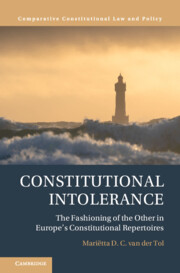Book contents
- Constitutional Intolerance
- Comparative Constitutional Law and Policy
- Constitutional Intolerance
- Copyright page
- Dedication
- Contents
- Acknowledgements
- 1 What Is Constitutional Intolerance?
- 2 Governing Religious Difference
- 3 Toleration, Time, and the Other
- 4 National Identity, Publicness, and Public Space
- 5 Dynamic Interpretation of Constitutional Concepts
- 6 Ad libitum Use of Constitutional Concepts
- 7 Constitutional Identity as a Political Instrument
- 8 Pseudo-constitutional Repertoires
- 9 Conclusion
- Bibliography
- Index
4 - National Identity, Publicness, and Public Space
Published online by Cambridge University Press: 09 January 2025
- Constitutional Intolerance
- Comparative Constitutional Law and Policy
- Constitutional Intolerance
- Copyright page
- Dedication
- Contents
- Acknowledgements
- 1 What Is Constitutional Intolerance?
- 2 Governing Religious Difference
- 3 Toleration, Time, and the Other
- 4 National Identity, Publicness, and Public Space
- 5 Dynamic Interpretation of Constitutional Concepts
- 6 Ad libitum Use of Constitutional Concepts
- 7 Constitutional Identity as a Political Instrument
- 8 Pseudo-constitutional Repertoires
- 9 Conclusion
- Bibliography
- Index
Summary
This chapter elaborates on the relationship between space and coexistence, and ways in which hegemony is reproduced in public space. Constitutionalism plays an ambivalent role in the reproduction of this hegemony, not least through the reproduction of a thick sense of publicness. This thick sense of publicness can be asserted against a range of “others”, such as religious, ethnic, and sexual minorities, whose identities may be subject to privatisation and retreat from public spaces. At the same time, constitutionalism offered a tangible alternative for the old order of toleration, recognising that religious divisions would be permanent, and that legal and social frameworks of accountability might support peace and order. Given that religious intolerance and the foundation of political order were entwined in early modernity, the establishment of the freedom of religion and the more general protection of religious minorities were vital to the project of the modern state.
Keywords
- Type
- Chapter
- Information
- Constitutional IntoleranceThe Fashioning of the Other in Europe's Constitutional Repertoires, pp. 51 - 68Publisher: Cambridge University PressPrint publication year: 2025

